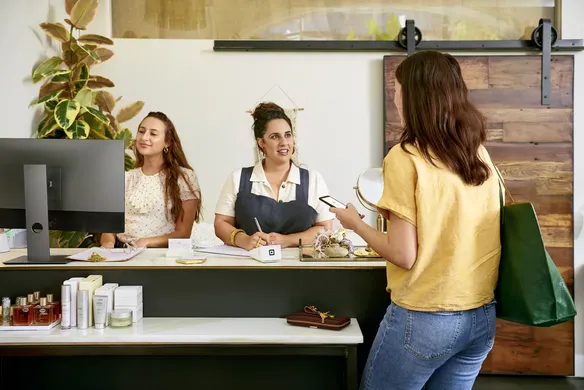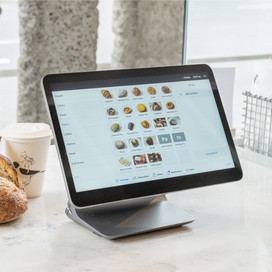Table of contents
Fuelled by social media, the makeup industry is booming, making it a fantastic opportunity for ambitious entrepreneurs. No matter whether your interest lies in the product or the service side of the industry, with the right plan, dedication and niche a beauty business has the potential to go big.
Benefits of owning a makeup business
Before we get to the how, let’s first look at the why. Why should you choose to start a makeup or beauty business? There are a few good reasons:
A popular product or service: As mentioned above, while they’ve always been popular, makeup products and services are currently experiencing a real surge in popularity, thanks in part to the rise of social media. One look at YouTube, Instagram or TikTok shows the prevalence of makeup tutorials and influencers.
Low barrier to entry: All you need to start a makeup artist business is time, talent and a few basic supplies. All you need to start a makeup product business is time and a bit of capital. The upfront investment here is far lower than other businesses.
Multiple selling options: You can either sell makeup as a product, or you can professionally apply makeup. This is one of the few industries where there’s an equal opportunity to start a product or service-based business.
Customisable and scalable: You can have a lot of fun creating a makeup business. You can make it your own by selling or making unique products, or specialising in a particular style.
Requirements to start a makeup business
If you’re wondering how to start a makeup making business at home, or a travelling makeup artist business, the first thing you’ll need to understand are the requirements.
Skills and knowledge
The depth of skills and knowledge you need will depend on the type of makeup business you plan to start. You might need skills and knowledge in:
-
Makeup application: If you plan to offer makeup artist services, you might consider undertaking formal training like a Certificate III in Beauty Services at TAFE.
-
Makeup manufacturing: Creating your own cosmetics is an option, although this can be a rather complex and scientific process, and plenty of rules apply.
-
Selling: If you choose to sell cosmetic products that you’re truly passionate about, sales might come naturally. But to achieve true sales success, it might be worth investing in your selling skills.
-
Business operations: As a business owner you’ll need to understand marketing, accounting, supply chain management and more.
Licences and permits
According to the Department of Health, the regulatory body in charge of cosmetics, almost all ingredients in personal care, skincare, make-up and cosmetic products are regulated as industrial chemicals for these uses.
As such you’ll need to register your business with the Department of Health if you:
- Import cosmetics from overseas.
- Import cosmetic ingredients from overseas.
- Create cosmetics from local ingredients using a process that involves a chemical reaction.
If you create cosmetics from local ingredients in a way that doesn’t involve a chemical reaction, you don’t need to register your business with the Department of Health.
You do however need to register your business with the ATO by obtaining an Australian Business Number (ABN), and your company (if you create one) with ASIC by obtaining an Australian Company Number (ACN).
Decide the type of makeup business to start
What shape will your makeup business take? There are three main paths available to you:
- Makeup artistry: Do you have a talent for making people look beautiful? You might consider becoming a professional makeup artist or beautician! This option usually involves meeting plenty of people and going plenty of places, as manymakeup artists travel to their clients.
- Cosmetic reselling: Perhaps you’re thinking of entering the product space rather than the service space. If that’s the case, the simplest avenue to success for your cosmetic business is to sell makeup products! Plenty of bulk suppliers can be found online which offer you the chance to put your own branding on each item.
- Cosmetic manufacturing: Do you dream of creating your own range of cosmetics? While you’ll need to keep in mind the rules mentioned in the section above, this can be the type of makeup business that offers you ultimate levels of creativity and control. Keep in mind, however, that it’s also the most complex.
The makeup industry is quite competitive, so the best way to succeed is to find your niche. Try to choose a specific type of product or service that you can market to a specific type of customer – which also makes stocking, marketing and running your business far easier – than do it better than anyone else.
Top 3 trending makeup products
Not sure where, to begin with your range of cosmetic products, or which types of makeup you should be used as a makeup artist? These three items form a perfect starting point.
-
Mascara: No facial feature pops quite like the eyelashes, which is why mascara is such an endlessly popular cosmetic item. This enhancer can thicken, lengthen, darken or curl your lashes, which frame and draw people into the eyes.
-
Foundation: Sometimes called ‘base’, the foundation is the skin-coloured liquid, cream or powder used to cover blemishes and even out skin tone. It’s wise to moisturise and prime the skin before applying the foundation.
-
Lipstick: Lipsticks, including lip stainer, lip liner and lip gloss, are used to colour, tone and texture the lips. While it might seem like one of the simplest makeup products, there can be more to lipstick than meets the eye (or in this case, lips); you’ll need to know how to apply it properly, and will need to choose from a range of colours and finishes, like matte, cream, satin and gloss.
Essential equipment & materials needed to start a makeup business
The first step in how to start a makeup making business or makeup artist business is to get the necessary equipment together. Some of the items you might require include:
- Tools: Cosmetic spatulas, steel palettes, mascara and lip wands, brushes, pads, sponges, hair clips, tweezers.
- Makeup and consumables: Moisturiser, primer, foundation, concealer, contour, highlight, bronzer, blush, eyebrow pencils, eyeshadow, eyeliner, mascara, lipstick, lip gloss, setting powder, cleansers and disinfectants, lash glue, Q-tips.
- Business equipment: Computers, printers, scanners, phones, business software and a vehicle for transporting you and your kit.
How much can I charge customers?
This particular question is a really tricky one to answer, as there are so many variables to consider. You might be selling cosmetics products or offering makeup services. You might be in the country or in the middle of a capital city. You might work from your home or rent a shopfront or salon.
With all this in mind, what you charge should be determined by a couple of main factors:
- Your costs: You need to charge an amount that will cover all of your costs and allow you to turn a healthy profit.
- The market rate: Customers won’t pay a high price if they don’t have to. You need to research what other, similar businesses are charging, and set your prices in the ballpark.
How to market your business
It’s time to turn to business development. You can’t expect that business will just come – you’ll need to go out and get it. Marketing a small business is a subject that deserves its own guide, but the most effective strategies include:
- Creating a website: Creating a website should sit at the very top of your to-do list. An online shop is your digital storefront, and allows you to market yourself affordably and effectively. Good news: with Square Online, creating an online store has never been easier!
- Word of mouth: People trust people, which is why word of mouth continues to be the most effective marketing channel there is. Spread the word of your new venture through family, friends and colleagues.
- At local markets: Customers love putting a face to a brand. Set up a stall at a local market, chat to passers-by and let them check out your products and/or services.
- Via social media: Makeup is made for social media! Invest in professional photography, and post regularly across Facebook, Instagram and any other platform that your target market uses.
Appointment solution for makeup businesses
If you choose to become a makeup artist, one of the main challenges you’ll face will be scheduling your work. You want to maximise the amount of work you squeeze into each day while avoiding double-booking yourself.
Square Appointments helps you to do all this and more. Your customers can choose a service, and then browse your calendar to find an available time slot that suits them. As soon as they lock it in, your calendar blocks that time off – no more double booking!
Payment solutions for makeup businesses
At Square we aim to make starting your own venture as easy as possible, by offering a complete suite of affordable and easy-to-use payment solutions.
- POS system: A point of sale (POS) system can form a complete business system for a makeup business – Square POS, for example, is capable of taking payments, offering loyalty rewards and tracking cash flow.
- EFTPOS machine: If you simply need to take payments, an EFTPOS machine like Square Terminal offers an instant, secure and cost-effective way to accept card and contactless payments.
- Portable credit card reader: Even simpler again, portable card readers like Square Reader plug straight into your phone, allowing you to accept chip and contactless payments through your device – ideal for market days or working on the road!
Now that you know how to start a makeup business, what’s stopping you? If you’re ready to create, sell or apply stunning cosmetics, Square is ready to help.
![]()











